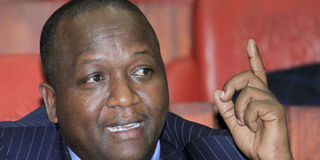Draft Bill sounds reasonable but will our MPs do the right thing?

Tiaty MP William Kamket defends his draft Bill, which seeks to change the country's governance system, before National Assembly's Budget and Appropriations Committee on March 1, 2018 at Parliament Buildings. PHOTO | JEFF ANGOTE | NATION MEDA GROUP
What you need to know:
- The greatest danger facing any democracy under a presidential system is that it is extremely difficult for an incumbent to lose an election.
- One of the problems with our structure of governance is the zero-sum effect of election victory which negates inclusivity.
If everything goes according to plan, Kenyans may soon have a stark choice to make: Whether to continue being ruled by a president or a prime minister, the only difference being in the title given to the person who will hold the most influential job in the land.
But there are four reasons why the draft Bill meant to facilitate that choice may not see the light of day yet.
First, nobody has really demonstrated comprehensively how the proposed structure of government (parliamentary) is supposed to be superior to the presidential system we have been used to, which is why a robust countrywide debate, and not one limited to MPs, is absolutely necessary.
Secondly, the Bill’s intention is not really to diffuse State power but to wrest it altogether from the presidency and vest it in Parliament, hence its potential attractiveness to legislators who will seek to control whoever they choose as prime minister.
REFERENDUM
The third problem is that such a fundamental change in the structure of government cannot merely be brought about through a Bill; it will involve a crucial amendment to the Constitution, which will have to be agreed upon by Kenyans during a vote.
Entrusting such a crucial task to a Parliament that does not really enjoy the confidence of Kenyans would be extremely naive.
This change would, therefore, require a referendum and it is doubtful that Kenyans are really ready for yet another such exercise at the moment considering they have already suffered two elections in three months, none of which solved the underlying problems.
Also, contrary to the assurances, it is not likely that the country can afford the huge resources required to administer a referendum.
The figures don’t add up.
PRIME MINISTER
The fourth issue is even if such a Bill were to be enacted, it would just be a game of musical chairs at the top of the food chain.
Why not go the whole hog and elect a prime minister who will take over all the functions of a president except the ceremonial ones?
Should that happen, won’t it be just a case of changing the title “head of government” from the president to premier, a matter of semantics?
In any case, before politicians get into a tizzy over the proposal, it is not likely that any legislation whatsoever is going to affect the tenure of the present administration, which is constitutionally in office until August 2022.
Those with a cause to worry are they who have pinned their hopes on winning the presidency after that date.
There are many attractive features in the proposed changes, nevertheless.
ELECTION RIGGING
The greatest danger facing any democracy under a presidential system is that it is extremely difficult for an incumbent to lose an election.
Many presidents, especially in Africa, blatantly steal elections, and if challenged, turn violently despotic.
On the other hand, there’s no reason why a prime minister would not steal elections or even consign the presidency to the dustbin.
After all, Uganda’s Milton Obote did it to Kabaka Edward Mutesa in 1966, and so did Zimbabwe’s Robert Mugabe to President Canaan Banana in 1987.
And indeed, there is no reason why an assertive Parliament would not hold prime ministers to ransom, effectively emasculating them.
INCLUSIVITY
The only advantage I can see in Mr William Kamket’s draft legislation is that two deputy prime ministers will be included.
One of the problems with our structure of governance is the zero-sum effect of election victory which negates inclusivity.
Any legislation that would ensure as many communities as possible are represented in government would be a boon.
But this can only happen if the president, prime minister and the deputies belong to different tribes, a clause that must be entrenched in the Constitution.
ETHNICITY
I would personally support any move that reduced the ethnic tensions that have become part of our lives and destroyed any sense of nationhood.
If to rectify this we must have a prime minister and two deputies, so be it.
The only issue is that our politics is extremely disorderly and our legislators not the most competent to forge stability out of chaos.
But there is a caveat to this support: Agitating for change for its own sake can become counter-productive.
Parliaments have been known to become tyrannical and in a phrase attributed to French writer Voltaire, “I would rather be ruled by one lion than a thousand rats”.
Magesha Ngwiri is a consultant editor. [email protected]





